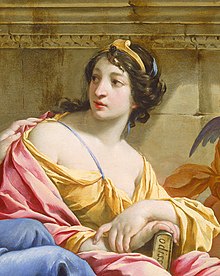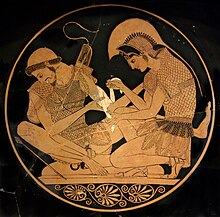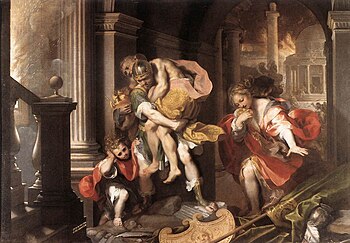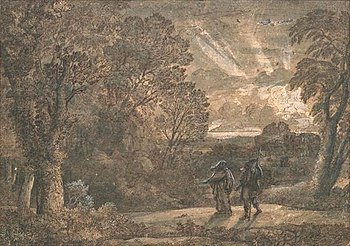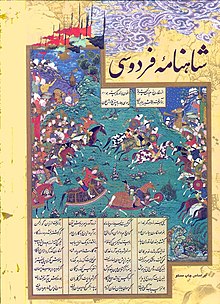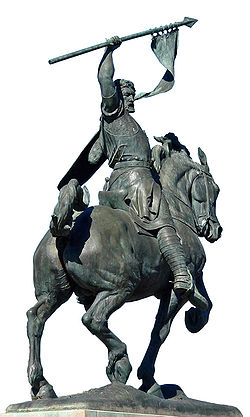Epic
The epic is an epic or narrative story, written most of the time in long verse (hexameter) or prose, which consists of the extensive narration of transcendental actions or worthy of memory for a people around the figure of a representative hero of their most esteemed virtues. It is one of the oldest literary subgenres within the more general epic or narrative.
Distinctive features, origin and evolution
In it, especially in Antiquity, when society was dominated by noble warriors and priests, fantastic elements or gods often intervene (the Sumerian gods in the case of the Epic of Gilgamesh, the Greeks in the case of Homer's epics, the Latins in the case of Virgil's Aeneid). Their plots almost always have to do with feats or dangerous feats related to warfare, marvelous journeys, or both, including many of them a journey to the underworld (nekyia or catabasis), a prophetic dream, or a vision from beyond the grave. This is related to the monomyth or Hero's Journey theory, according to mythologist Joseph Campbell. Its extension is very large and they disappear throughout history until today they are no longer composed, because they are not a reflection of a society in which power is held by a noble class dedicated to war with a system of values focused on in the individual honor or the collective honor embodied by the main character, the hero or protagonist, often seconded by another hero next in importance and helper, called the deuteragonist.
The current epic continues to exist, but in another form or literary genre that reflects the values of another social layer installed in power since the bourgeois revolutions: the middle class or bourgeoisie. It is about the modern novel, which had its Golden Age in the 19th century, when this social layer came to power. The transition between both genres, that of the heroic epic and the modern novel, occurred in Europe with a parody of the last forms of the ancient genre, the books of chivalry, in Quixote (1605 and 1615) by Miguel de Cervantes.
The last great era in which epics were created was the Middle Ages, with their epic songs or medieval epics; already in the 19th century, they were completely eliminated or rather replaced by the realistic novel or epic of the ordinary hero or of the middle class who at that time was conquering political power and social prestige and revealed in it values other than noble honor and characteristic of a new social class, the bourgeoisie: individualism, materialism, realism.
Among the subgenres of the epic are the epilio, epilion or epic song; the song of deed; the icelandic saga; the ancient epic romance; the heroic poem or cult epic poem; the roman courtois; the book of chivalry; the burlesque epic and the novel. The main characteristic of the epic is its ambitious extension, distributed through various rhapsodies or songs.
Early epic sketches were the product of preliterate societies and oral poetic traditions. In those traditions, poetry was transmitted to the audience and reproduced by purely oral means. The classic studies on the popular epic of the Balkans carried out by Milman Parry and Albert Lord demonstrated the paratactic model used in the composition of this type of poems and the importance of mnemonic formulas in their suddenness. The long epics were built in the form of short episodes of equal interest and importance, and the reciter used certain transit passages to give himself time to remember each of the passages that he had to link, transit passages that for this reason were very repeated constituting the so-called formulas or formular style. Parry and Lord also suggested that the works of Homer (the first author of epics) could have been composed in a similar way, from the dictation of an oral text.
Classical epics must possess at least ten characteristics:
- Invocation or preliminary supplication to the Musa.
- Initial formulation of the subject or subject of the work, usually a dispute or war, a wonderful journey or both at once.
- Start In medias res.
- The space of action is vast, covers many nations or the universe.
- Use of repeated epithets and formulas.
- Inclusion of extensive listings.
- Featured presence of long and careful discourses.
- Intervention and involvement of fantastic gods or creatures in human affairs.
Old Semitic Epic
The interesting ancient Semitic epic was modeled on the confrontation between a hero who symbolized civilization and urban values, the one-third divine king Gilgamesh, and another hero who represented natural, peasant and rural values, Enkidu. This is the matter that configures the so-called Epic of Gilgamesh, in which both heroes become friends against the gods who want to make them enemies; after fighting against the giant Humbaba and many other adventures, Enkidu dies and, overwhelmed by grief, Gilgamesh consults with the old Utnapishtim, who made the ark to escape the deluge, asking him how to bring him back to life; he travels to the underworld in search of the herb of immortality, but in an inattentive moment a snake snatches it from him. The end of the text is very distorted, but it seems that Gilgamesh, who is only one third divine and two thirds human, commits suicide. This epic, one of the most important ever written, demonstrates how man can become a superman, almost a divine being, but not a god. There are elements of the Epic of Gilgamesh that it has in common with Genesis, the book of the Old Testament, and in other episodes of other literature, Egyptian.
Major Greek epics
Attributed to Homer, a blind aedus or singer of poems (although some believe that it is a set of poems united by a common recaster, see Homeric Question), two long epics in hexameters, the Iliad and the Odyssey, respectively starring the heroes Achilles and Odysseus (also called Ulysses); They constitute the foundation of the common culture of the Greek peoples.
There are hardly any remains of the Destruction of Troy, of the Thebaid and of the Oedipodia. The Batrachomyomaquia, or war between the frogs and the mice, is mocking. Later are the Posthoméricas of Quintus of Smyrna and the Argonáutica of Apolonio de Rodas. The novels of Dictis Cretense, from the Greek side, and Dares Phrygium, from the Trojan side, very popular in the Middle Ages, are presented as real stories of soldiers who attended the Trojan War, and therefore as historical works.
The Iliad
The Iliad narrates a period of 52 days during the siege by the Greeks of the city of Troy, a city on the eastern coast of the Aegean, north of Asia Minor. The cause of the siege was that Prince Paris, son of the King of Troy Priam, eloped with Menelaus's wife, the beautiful Helena. The main hero is Achilles, "he of the light feet", the best warrior of the Greeks, practically invulnerable for having been submerged by his mother, the sea goddess Thetis, in the magical waters of a river, which they have made him invulnerable except where his mother held him, the heel. At the beginning of the play there is a great plague in the Greek camp and Achilles has withdrawn from combat angry because Agamemnon, head of the Greek coalition, has taken his concubine Briseis, kidnapped from the Trojan city. Consequently, the combats run unfavorably for the Greeks, although in them Diomedes, Ajax the Great, Menelaus and his brother Agamemnon ("king of men") shine, well advised by the wise and old Nestor, and some gods who attend the combats and even participate from time to time in them, stimulated by the beauty of the fight. They support the Greeks Hera, Athena ('owl-eyed') and Poseidon; they support the Trojans Aphrodite, Ares and Apollo ("he who hurts from afar"); Zeus ("who rolls up the clouds") declares himself neutral; although at a certain moment he supports the Trojans at the request of Thetis.
The reason for the war actually came from afar, when at the wedding of Thetis and Peleus the goddess Eris or Discordia, uninvited, throws a golden apple at the party in revenge (the "apple of discord& #34;) with the inscription "for the most beautiful". Aphrodite, Athena and Hera disputed the prize and Zeus appointed the Trojan Paris as referee, who chose Aphrodite; Since then, Hera and Athena's rancor has focused on Troy, the homeland of Paris. Aphrodite, in exchange for being chosen, had offered Paris the option of choosing for herself the most beautiful woman on earth. Paris chose Helen, queen of Sparta, and although she was married, Aphrodite helped him in her pursuit. The abduction of Helen by Paris offers the appropriate pretext and the different Greek peoples unite in a common expedition to recover the wife of Menelaus ("good on horses"). After donning the armor of Achilles his male lover Patroclus for the purpose of encouraging the Greeks in combat, the Trojan prince Hector ("horse tamer"), the best of the Trojan warriors and brother of Paris, kills him; Devastated, Achilles decides to abandon his sulking inactivity to take personal revenge on the Trojans and Hector, defeats him before the walls of Troy and drags his body in front of all the Trojans and, of course, his father, King Priam, without agreeing. to their pleas for burial. Priam secretly leaves Troy and arrives at Achilles' tent, managing to move the hard heart of the hero, so that he agrees that he can take his body and give him a dignified funeral. Here ends the Iliad.
Posthomeric
The war continues, but the Greeks achieve no definitive success. Finally, Odysseus or Ulysses, so clever that he did not want to go to war and pretended to be crazy so that they would not take him, come up with a stratagem, ruse or ruse that will deceive the Trojans; the Greeks pretend to retire and leave a wooden horse as an ex-voto to the gods; The Trojans, happy to believe that they had got rid of such tough enemies, make it roll to Troy, despite the warnings of the soothsayer Cassandra, condemned by Apollo to tell the truth about what is going to happen without ever being believed, and of the Laocoon the priest, who perishes with his children, all devoured by a serpent that Poseidon makes come out of the sea. Indeed, the horse is hollow and inside there are some Greek soldiers who, at night, come down and open the city gates for the Greek army, who enter the square and burn it down and loot it; Only Prince Aeneas is saved, carrying his father Anchises on his shoulders, along with his family and friends. The Latin poet Virgil will then sing an epic in Latin starring him, the Aeneid. Achilles, however, dies after receiving a poisoned arrow from Paris on the heel, but he had already said that he preferred a short, intense and glorious life to a long and dull life. Somewhat later, Ajax and Odysseus (Ulysses) fight to recover the body of the Greek hero and bury it next to that of his friend Patroclus. After the funeral both Greek heroes claim Achilles' armor as a reward for his efforts. After a dispute over wits, Odysseus receives the armor and Ajax, furious, falls to the ground exhausted and when he gets up he is mad with fury; in his delirium he mistakes a flock of sheep for the Achaean leaders, Odysseus and Agamemnon, killing all the animals. When Ajax awakens from his madness, he finds himself surrounded by blood and decides to take his own life rather than live in shame and dishonor. For this he uses Hector's sword, which he had given him as a gift of honor after his first duel.
The Odyssey
Homer's second epic, called the Odyssey, has Ulysses or Odysseus as its main protagonist and narrates the eventful return journey from Troy of the hero Odysseus, to his homeland on the island of Ithaca. The hostility of the god of the sea Poseidon makes him go through all kinds of dangers and adventures, and that of Venus through various dangerous love affairs that hold him back for a long time, while his son Telemachus searches for him on the seas asking the other heroes of war of Troy where he is, and even some sea god who accidentally fishes in the ocean, like Proteus, and while Odysseus's wife, Penelope, puts up the pretenders to the throne on the island, because they believe that Odysseus is dead and must marry with one of them. Penelope discourages and deceives them by promising that she will decide when she finishes a cloth that she is weaving, but without their knowing she unweaves by night what she spins by day. Odysseus goes through various adventures: he manages to flee from the cannibalistic giants called Lestrygonians and from the land of the lotus eaters, some men who feed on a flower that causes oblivion; that of the gigantic Cyclops Polyphemus, shepherd son of Poseidon, who devours some of Odysseus' companions and who blinds him with a hot stick inside the cave where he is imprisoned; that of the sirens, whose marvelous song drives the sailors mad and breaks their ships between the rocks, but which Odysseus avoids by having himself tied up and closing the ears of his sailors with wax; that of the sorceress Circe, in love with Odysseus and who transforms her companions into pigs and magically prolongs the duration of time at her whim; that of the goddess Calypso, who also falls in love with him and promises him eternal life and youth, but who is forced by Zeus to let him go; that of the shipwreck and the naked arrival on the beach before the eyes of Nausícaa; tells of his adventures in the court of Alcínoo; he crosses the terrible passes of Scylla and Charybdis, each more dangerous; that of the cave where Odysseus offers a sacrifice to the dead and experiences the vision of the nether world and, finally, the return to Ithaca, in which, helped by Athena, he changes his appearance to that of an old beggar so as not to be recognized, although his dying dog Argos is not fooled by it. With his son and his wife, he plans revenge on the idlers who intend to marry his wife; he makes the groom decide among those who can draw his bow, something only Odysseus could do; no one does, but the old man dares to try and when he tenses him, he shoots the suitors and with the help of Telemachus kills them.
Roman epics
The pre-classical poets Quintus Ennius or Cnaeus Nevius already composed epics in Latin, but it was Virgil who wrote what is considered the national Roman epic, the Aeneid, in twelve songs and a total of almost ten thousand hexameters; the first six narrate the journey of Aeneas after the fall of Troy in search of a land to settle and constitute a kind of Odyssey, and the last six, which narrate the wars in Latium of the Trojans seated in it, an Iliad. The work is from the 1st century BC. C. and was written by order of Emperor Augustus, in order to glorify, attributing to it a mythical origin, the Empire that began with it. To this end, Virgil elaborates a rewrite, rather than a continuation, of the Iliad.
The plot is as follows: Aeneas, a Trojan prince, fled the city after being burned by the Achaeans. He dragged his father and his son away, and his wife followed a few steps behind. But she perished in the darkness, and Aeneas, desperate, embarked with his faithful friend Achates and other survivors in search of a new land. His enmity with Hera led him to wander for a long time, until he was thrown on the shores of North Africa, in Carthage. There lived Queen Dido, who fell in love with him through the work of Cupid, who shot her heart with an arrow so that she would forget her deceased husband; she then she held him for a long time. The kingdom was hospitable and all the Trojans wanted to stay in Carthage, but Aeneas knew that it was in Italy that he should found his empire. After her departure, Dido committed suicide on a pyre with the sword of Aeneas forever cursing her beloved, making him swear revenge on her people for destroying her father's children, the future Romans. In this way, the picture that justifies the eternal enmity between two brother nations, that of Carthage and that of Rome, is created, which would become the Punic wars. On his way to Italy he will descend into hell, where his father, already dead, reveals to him that he will found a flourishing empire, Rome, until the time of Augustus.
In the next six books Aeneas arrives in Latium, where King Latinus ruled. Latinus's daughter, Lavinia, was betrothed to Turno, the Rutulian chieftain, but the oracle had revealed to Latinus that a man from the sea would marry his daughter and create a great empire in the name of the Latins. Then Turno and Aeneas declared war and began to battle for a long time. One day allies came from one and another day from another, and the battle never ended. Meanwhile, in heaven, Venus and Juno helped each other without Zeus giving victory to either. In the end, Aeneas kills Turno in combat and wins Lavinia's hand. Then they will found a kingdom that will one day become Rome.
If we don't count the numerous epilios or small epics composed by Latin poets, the Farsalia of Lucan, the Punic of Silio Italico, the Punic of Silio Italico, the Farsalia i>Argonáuticas by Valerio Flaco and the Thebaid and the Aquileida by Stacio. Epic poets of the Late Roman era often stray into panegyric; such is the case of Claudio Claudiano, of Merobaudes and of Draconcio. Many other epics have been lost, or there are hardly any remains of them, such as the Bellum Historicum of Hostio, the Bellum Sequanicum of Varro Atacinus and others by Rabirius and Vario Rufus, this friend of Virgil's who was the one who published his Aeneid, thus burying his own epic in oblivion, despite the fact that in his time he was highly appreciated in the circle of Maecenas. Other authors of epics were Albinovano Pedo, of which a long fragment has been preserved that recounts the voyage of Germanicus to the North Sea, and Herculano, author of a Carmen de bello Aegyptiaco.
Persian epics
The Book of Kings or Shahnameh by Ferdousi is an epic of the X after Christ written in Persian, an Iranian language barely contaminated by Arabisms at the time. It is the second longest epic after the Hindu Majabhárata, as it has a total of 60,000 verses. It tells the story of ancient Iran and especially the history of the Sassanids, reaching the point of confusing the legendary kings with the Achaemenids in the past. Ferdousi is inspired by earlier texts by Abu Mansur Abdul Razzâq and even included a thousand verses by Daqiqi citing its provenance. Iranians consider it a sign of national identity, from which they highlight its originality, since it does not take any narrative material from any other literary tradition. Its survival and vitality are attested by the fact that it continues to be recited to the sound of the drum like a song in the zurjâneh or (houses of strength), a kind of traditional gym while the attendees do gymnastics with rhythmic movements.
Oriental epics
The Japanese epic was fundamentally configured around the fights between the samurai clans of the minamoto and the taira, which gave rise to the Heike Monogatari.
Hindustanic Epics

In ancient India, the epic was characterized by the predominance of fantasy and the marvelous. There are two main samples: the Majábharata and the Ramaiana, written in Sanskrit.
The epic comes from a popular poetry of traditional stories of undoubted historical origin. These stories come from the Vedic era, the professional reciters organized in castes, the suta, bards and panegyrists, drivers of the cars during the wars, transmitted these epic stories, adapting and completing them. From here came the two great epics, the Majábharata and the Ramayana. The Sanskrit language of these epics is in prose and verse; the narration is archaic in form, but the narrative verses form the most important part; the speech characterizes the epic composition and replaces the direct style, mixing in it religious maxims and moralizing conclusions.
The Mahabharata
The Mahabhárata consists of about one hundred thousand shlokas (couplets of verses of sixteen syllables). Its time of composition is not known with certainty, and rather they seem to respond to a cumulative process of enlargements. Some date the gestation of the work at the time of the appearance of Buddhism (around the 6th century B.C.; it reached its classic and definitive form in the 2nd century B.C.
It is about the dynastic struggles between the descendants of King Bharata: the pious Pandavas and the evil Kauravas. The Pandavas win, helped by their friend the god Krishna. The story is interspersed with fantastic legends about such fights and beautiful episodes are interspersed such as that of King Nala and his wife Damaianti, who are persecuted by the demon Kali.
The Ramayana
The Ramayana is an epic three or four centuries after the Mahábharata, although some place it in the 8th century B.C. c. It is smaller in size and consists of about 24,000 śloka. It is attributed to the legendary poet Valmiki. In it, Prince Rāma rescues his wife Sītā, kidnapped on the island of Sri Lanka by the devilish Ravana, a ten-headed monster. Being one of the most important literary works of ancient India, it has a profound impact on the art and culture of the Indian subcontinent and Southeast Asia. The Ramayana is not just a religious tale. The colonization of Southeast Asia by the Hindu people began in the 8th century. Empires such as the Khmer, Majapahits, Sailendra, Champa and Sri Vijaya were established. Thanks to this, Ramayan became popular in Southeast Asia and manifested itself in literature and temple architecture, particularly in Indonesia, Thailand, Cambodia, Laos, Malaysia, Burma, Vietnam and the Philippines.
Hispanic epics
Writers born in Hispania composed epics already during the Roman Empire, such as Lucanus, author of the Farsalia, a poem dedicated to Nero that describes the civil war between Caesar and Pompey and the suicide of Cato the Younger; It is a poem where an internal desire to return to the Republic beats and where the philosophical spirit of stoicism dominates; The phrase about the noble and worthy Cato became very famous: «Victrix causa diis placuit sed victa Catoni» ('the cause of the victors pleased the gods, but that of the defeated Cato'). This work already bears the stamp of typical Spanish realism, to the point that some have considered it more of a historical poem than an epic. Prudentius, the singer of the Christian martyrs, also composed an allegorical epic in which the personified virtues and vices fought, the Psychomachia.
On the other hand, during the Middle Ages there was no shortage of attempts to elaborate learned epics in Latin, such as the Carmen campidoctoris, about the Cid Campeador. At the same time, an epic was developed in the vulgar language, incited as a national response to the example of the French epic, which was known for its penetration through the Camino de Santiago, and articulated several epic cycles mainly around the figures of Rodrigo Díaz de Vivar, the Cid, and Bernardo del Carpio, and others less known.
The Cantar de mio Cid narrates the process of recovery of honor by the great warrior Rodrígo Díaz, accused by the high court nobility of staying with the outcasts on his return from a fundraising trip to Sevilla; King Alfonso is enraged and banishes him; but Captain Martín Antolínez intrigues to get a loan from the Jews Raquel e Vidas, taking advantage of the fame of a thief that they want to throw at his friend, with the guarantee of two large chests tightly closed with chains and that actually contain only sand. With that money they can leave Castilla; El Cid leaves his wife and daughters in the monastery of San Pedro de Cardeña and earns his living fighting against the Moors (and against the vain Count of Barcelona) obtaining more and more loot; he culminates his military exploits by conquering Valencia together with his brave captains, the impetuous and stuttering Pero Bermúdez, Ansúrez and his lieutenant Albarfanez, historically as important a hero as El Cid himself and defender of Toledo. From each conquest he sends to the Court the corresponding fifth of the king, who gradually deposes his attitude and finally only imposes as a condition to admit it again that his daughters Elvira and Sol marry the infantes de Carrión, some sinister characters from Leon who are not they possess the slightest virtue.
El Cid successfully defends his kingdom from the attacks of King Búcar of Morocco. But the captains of the Cid hide the cowardice of the infants (in battle and when a lion is released) and their felonies (one of which is, for example, trying to assassinate the Moor Abengalvón, friend of the Cid) and these, dishonored by the general contempt, they decide to whip their women and leave them abandoned in the oak grove of Corpes and return to their native Carrión. El Cid's nephew, Félez Muñoz, discovers his cousins and returns them to his father. He then plans a legal revenge: those who must confront the infants are their captains, since they have hidden the cowardice of their dealings, and during the Cortes he recovers the dowry (for example, his swords Tizona and Colada) and the infants are challenged to a duel by the captains of El Cid, who thus humiliate all the Burgos nobility. The Cid's daughters marry princes and thus ends the poem happily.
Already in the Renaissance, in 1552 Juan de Quirós published a religious epic about the passion of Christ, which he titled Christopathy. The conquest of Latin America gave rise to the composition of several cultured epics, some truly memorable, such as La Araucana by Madrid's Alonso de Ercilla, which recounts with strong vigor and great expressiveness the conquest of Chile by the Spanish, in the which the author participated personally. In general, the influence exerted by the Canon of Ferrara on the educated epic poems of the XVI century is important, and deserves more attention. than they have had. On the other hand, in the 17th century and during the Baroque there are many well-resolved epics, such as the various ones composed by Lope de Vega, although El Bernardo o La derota de Roncesvalles by Bernardo de Balbuena stands out in particular., where the national theme of the famous hero and his confrontation with Roldán is superimposed by an Italianate ariosteque element of a fantastic nature, actually dealing with a kind of book of chivalry in verse.
The cultured epic declined in the XVIII century, but it is still possible to find a last exponent of it in Hispanic America of the 19th century, through the two great poems by José Hernández, la ida y vuelta de Martín Fierro, which some consider a versified novel.
Works
Antiquity
- Babylonian-Asian
- Poem of Gilgamesh
- Greek
- Iliad Home
- Odyssey Home
- Argonáuticas of Apolonius of Rhodes
- Posthomeric of Quinto de Esmirna
- India
- Mahabharata (the second largest in the world)
- Ramaiana
- Romana
- Eneida of Virgilio
- Farsalia of Lucano
- Punica of Silio Itálico
- Argonáuticas by Valerio Flaco
- Tebaida of Estacio
Middle Ages
- Heike Monogatari or Song of the Taira Japanese
- Shahnameh, epic of the Persian poet Ferdousí
- King Gesar, Tibetan epic (the longest in the world)
- Digenis AcritasByzantine epic
- Beowulf (anglosachon)
- Mal'abat Al Kafif ez-ZarhouniMoroccan epic of the centuryXIV
- Song of the Nibelungos (German)
- Singing from my Cid (castellano)
- Cantar de Roldán (French)
- Edda (Iceland)
- Kalevala (Finish)
- Sagas (Iceland)
- Sundiata Epopeyaof African literature
- The Divine Comedy, of Dante Alighieri
Modern Age
- Orlando furiousof Ludovico Ariosto (1532)
- La Araucana of Alonso de Ercilla (1569, 1578 and 1589)
- The Lusiahs of Luís de Camões (1572)
- The Franchise of Pierre de Ronsard (1572)
- Jerusalem liberatedof Torquato Tasso (1581)
- The Monserrate de Cristobal de Virués (1587)
- The Conquered Jerusalem de Lope de Vega (1609)
- La Cristída of Diego de Hojeda (1611)
- The Bernard or the defeat of Roncesvalles of Bernardo de Balbuena (1624)
- The Lost Paradise John Milton (1667)
- Popol Vuh (1701-1703)
- The Henrie de Voltaire (1723)
Contemporary Age
The Americas
- Martin Fierro of José Hernández (1872)
- I will of Juan Zorrilla de San Martín (1888)
- General Song of Paul Neruda (1938-1950)
- The Empire of Dreams of Giannina Braschi (1988)
- Omeros de Derek Walcott (1990)
- Angels in America by Tony Kushner (1991)
- Lime Stone (on the history of Barbados) by Anthony Kellman (2008)
- United States of Banana de Giannina Braschi (2011)
Contenido relacionado
Panthropy
Paranoia (roleplay)
Francis of Quevedo

